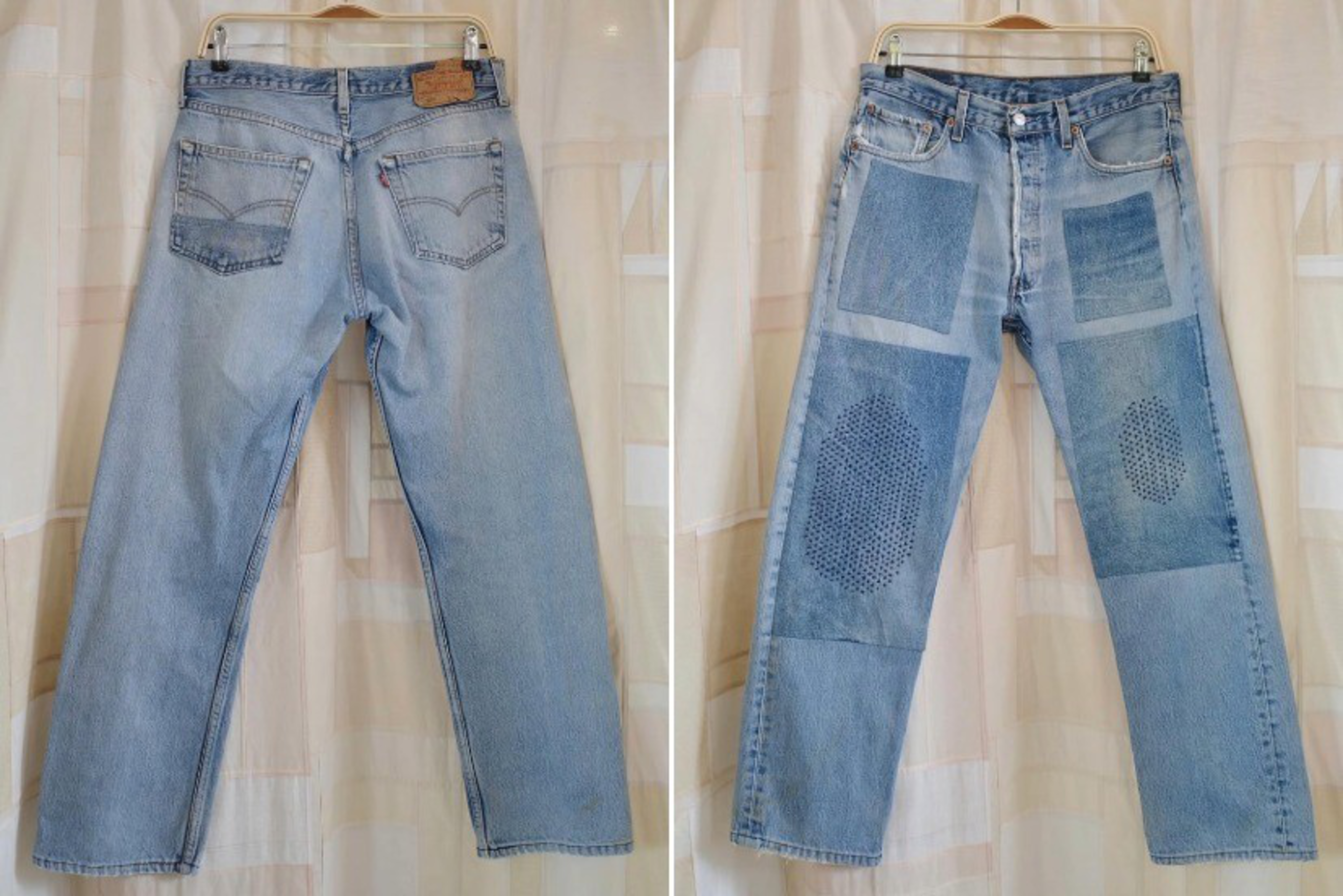Jenna Giusto was scrolling through Instagram this month when her finger stopped on an ad from Banana Republic. What would generally be among the most mundane things to see on the platform made her stomach sink.
The ad showed a pair of light-wash blue jeans, decorated with patches on the thighs and knees, some stitched with hexagonal patterns. Giusto recognized the traditional Japanese sashiko-style stitching technique because it’s exactly the method she and her boss, Lindsey Hansen, use to repair vintage clothing at The Future Past, a small vintage shop in the Inner Richmond.
“I was like, ‘Oh shit, these look exactly like our jeans,’” Giusto said. “There are not many people doing denim repair around here, and I’ve never seen this kind of patchwork with those repairs in these exact places.”
The Banana Republic jeans looked more than a little similar to a pair she recalled. In fact, she was sure she remembered Hansen hand-stitching something almost identical. So Giusto combed through The Future Past’s Instagram page until she found it: a pair of vintage Levi 501 jeans, sold at the shop in March 2024, with the same design details, down to the placement of the patches and the style of stitching. The Banana Republic jeans were released this fall.
“I was shocked at just how blatant the knockoff was,” said Hansen.
Both pants use the 17th-century stitching practice known as sashiko, which has hundreds of patterns, but the Banana Republic pants use a virtually identical star-shaped style as Hansen’s, in roughly the same places.

Hansen on Wednesday posted a video on Instagram showing the jeans side-by-side and alleging that the “fast fashion brand” had stolen her design. Comments flooded in under her video as well as on Banana Republic’s ad campaign video from eight weeks ago, lambasting the brand.
That night, Banana Republic deleted the Instagram video, and by Thursday morning, the pants were no longer listed for sale on the website.
“It’s not just a theft of design but an erroneous disregard of what we’re trying to do, which is save the clothes that we have and keep them in circulation so that people don’t have to buy new clothes,” Hansen says in the video, referring to her store’s upcycle ethos.
Giusto checked the shop’s ledger and found that they had sold the pair of Levi’s shortly after they hit the floor in spring 2024 but had no record of who the buyer was.
“It feels like such bullshit,” Giusto said. “There is no doubting that this is a direct copy of our jeans. There’s no excuse you can make; it’s so obvious.”
Jessica Geesey, a Bay Area designer at Banana Republic who appeared in the Instagram ad campaign for the pants, responded after people flooded the comments with accusations.
“We actually found a vintage pair on our travels that we then recreated and paid homage to,” read Geesey’s comment on the now-deleted Instagram post, according to a screenshot that Giusto shared with The Standard. “I’m sorry you feel like you were ‘copied’ but that definitely wasn’t the case in any way shape or form. We are simply paying homage to a centuries-old Japanese tradition.”
Geesey did not respond to requests for comment. On Thursday morning, her LinkedIn profile and Instagram accounts had been deleted.
“We take their concerns seriously as a brand that supports the local creative community,” Jason Allen, a spokesperson for Gap, which owns Banana Republic, said in a statement. “Our team is looking into this matter and will handle as appropriate.”
Hansen said she does not intend to pursue legal action against Banana Republic, pointing out that The Future Past does not have the resources to pay for a lawsuit.
“They could have paid us for our design idea, or just acknowledged that they fucked up,” Giusto said.
Zac Posen, creative director of Gap, has spoken out against the issue of copyright infringement and its outsize impact on boutique designers. In 2007, he supported legislation authored by Sen. Chuck Schumer of New York to protect designs for three years and fine copycats up to $250,000. The bill did not pass.
